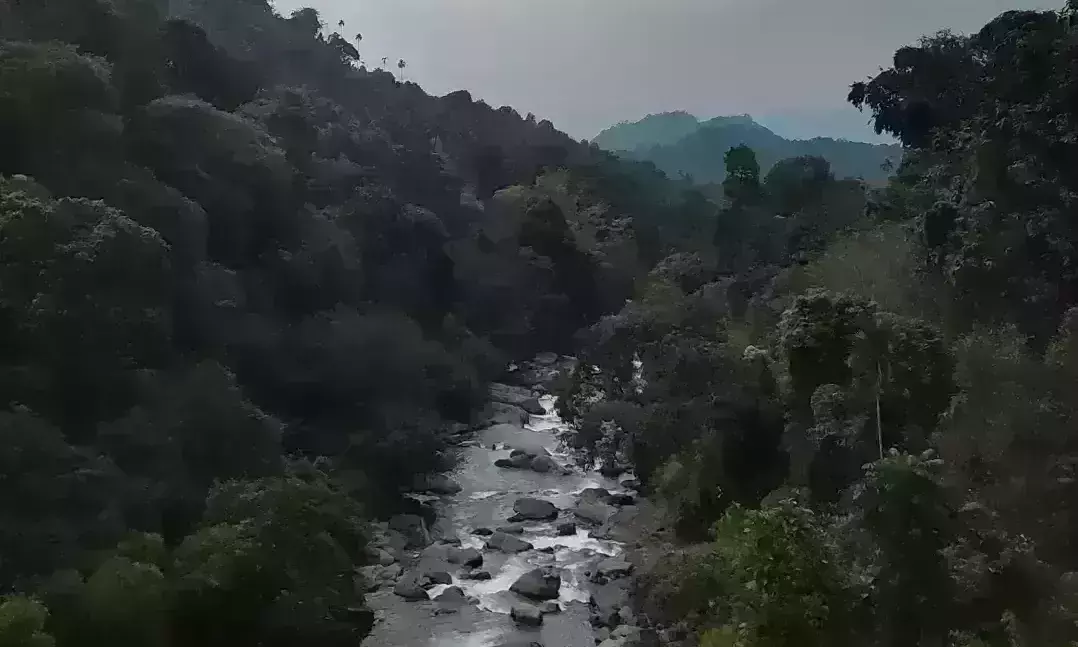

The case of Thusharagiri ecotourism centre: an ownership ding dong
text_fieldsTransfer of ownership rights of Thusharagiri mountain region, in Kerala's Kozhikode district, to private owners is being questioned as parts of the region are vested back to private owners as per a Kerala High Court judgment. Ongoing protests over the ownership of the region raises several questions about Kerala's ecologically fragile areas, private forests vesting and assignment act and its history of land reform policies.
Around 24 acres of the encircling region of Thusharagiri mountains, which is now the entrance of Thusharagiri ecotourism centre were given back to the owners who are migrant farmers from Southern Kerala.
It was after two years of environmental struggles that the 270 acres of Thusharagiri was acquired by the government, adding it to the ecologically fragile land (EFL) category. This was done after evicting farmers. There are 71 claimants to acres of land. The court ordered allowing the possession of 24 acres of land, on the basis of a tribunal for Ecologically Fragile Lands Act cases that deleted regions of Thusharagiri from the category.
The Kerala High Court judgment issued on February 2, 2021 on the petition filed by Varkey Chakkalakkal and Jolly directed the state of Kerala to 'hand over the possession of the land in question to the petitioners'. Currently, several environmental activists fear that the Kerala HC judgment would set a precedent to more claimants to the land, which would lead to privatisation of the forest.
On 24th November afternoon, protesting farmers gathered at the eco tourism centre raising demands including ending the anti-farmer actions of the forest department, farm land for farmers etc. Water conservationist, environmentalist and Magsasay award winner Rajendra Singh visited Thusharagiri later on the day with members of Kerala River Protection committee. The farmers attempted to have a talk with Rajendra Singh.
"We need to protect this type of land, this type of stream, this type of the origin of the river. If we don't protect, our future is not safe. This movement is for a better future for this river, the better future for all- including the wildlife, forest, rivers, and farmers," Rajendra Singh said during his short visit. ''The first right of the river is the land right of the river. This is the place from where the child comes out from the mother's body, this is where more protection is needed. If you don't protect the baby, how are you going to take care of it ahead?"he asks.
"In the region that begins from the facilitation centre ahead the waterfalls, you still can see coconut trees. This region was transferred as cultivable land after 1981. With the Kerala Private Forests (Vesting and Assignment) Act 1971, the Kerala government allotted acres of land to the landlords from Palakkad, Kozhikode, Eranadu regions. The land was provided for cultivation since they were considered unemployed and left with no means for survival. Since they had no habit of cultivating the land on their own, they kept agents who cut the trees and cleared the forest'' Sebastian Vamattam, one of the complainants told Madhyamam. "As far as I know, the landlords didn't come or stay here," he added. ''In 2000, according to the EFL Act, 270 acres of forest land was cleared for cultivation and the rest of the area of forests notified as EFL. That is illegal. EFL is a means to reacquire the land the government lost," Sebastian said. "We were told in the beginning that this will not affect our farming, later they started saying not to clear the shrubs in land or cultivate anything. A few years later the forest tribunal surveyed the cultivation. The tribunal judge who visited the land gave a judgment that this is agricultural land turned into forest. He cancelled the EFL notification. The High Court rectified this part, stating that the tribunal did not have the authority to cancel EFL status. The fight lasted for twenty years," Sebastian added.
"If an accurate price will be provided for the farmers, they are ready to give the land to the government. It gets difficult when all this gets tangled in bureaucratic circles," Babu, one among the protesters said.
When tracing the history of land transaction, we see how the landlords of Kuthiravattam family, including Prabhakara Thamban acquired hundreds of acres of land from the government citing that they do not have any land anywhere in Kerala, all they lost due to the land reforms, All Kerala River Protection Committee state general secretary TV Rajan explains. "They filed a petition to the government, it reached the court and each family was provided around 15 acres to 17 acres of land. Thirty two members of this family who filed a case were provided 270 acres of land." The environmental movement against deforestation continued till 2000 from the 1980s. The region was known as Jeerakapara. Jeerakappara Forest Protection Committee was formed by farmers, natives and the Church. It was as a result of the struggle that the state government acquired the land. The thickest trees were cut off and the land was sent off to around sixty persons, as small units of acres. By 2000 the land was barren, in twenty years it now turned into a thick forest" TV Rajan said.
''There are elephant pathways, a variety of birds, reptiles that are facing extinction and butterflies. It is an animal inhabited area, in the past six months two baby elephants died in Chalippuzha. Last year elephants attacked the tourism center area. But the fact that the area is encircled by forest is not presented by the government in the court" he noted.
The environmentalists put forward few demands to the state government.
If ownership of the region goes to private parties, the rest of the claimants who are farmers would approach the court holding this judgment as a precedent. The environmentalists fear that if it happens, the region would be privatised. They demand the forest department to acquire the ownership.
They say that it is not clear whether cultivation will be possible in the land again. The potential threat over the waterfalls would directly affect Chalippuzha, a river that originates from the waterfalls. Environmentalists think that this would affect the hydroelectric projects as well.
"We already filed petitions tothe state government and central government and demanded them to re-notify the land. We think the state government failed itself in this case. They did not mention that there is wildlife. There is only one witness who was heard by the High Court, a forest range officer from Thamarassery. The witness said that he had gone to Thusharagiri only once and he did not know about its wildlife features in detail," Rajan said.
"An advocate commissioner appointed by Kerala High Court reported that there are 8,008 trees counted. This was pointed out as something impossible. It is lawful that the forest-encircled area must be retained as such. The High Court commissioner or the government's counsel did not present in the court the topography of this area. We are getting ready to take all possible measures legally."
The government always had acted in favor of the upper caste communities. If a landlord's land is acquired by the government, they have to provide an affidavit to the government stating they do not own land anymore anywhere in the state. This was not done in the case. We think that the landlords were not landless at the time of this transaction. "No green conditions for forest conservation even when the farming can be done, was put while providing land ownership to them," he pointed out.
Rajan said that the forest minister in a meeting told the representatives of the river protection committee that tourism projects will be initiated in Thusharagiri.
"The western ghats is a prosperous mountain system. Mountains need more protection. The government will say we are creating a power, for river power they say run the river in tunnels. The tunnel is not healthy for the river. You can't say the river can flow internally. Give the freedom for the river without any type of obstructions. We can't obstruct the independent flow. This should be more sensitive, the tunnel is not healthy for a river," Rajendra Singh explained while mentioning Kerala's proposed tunnel road interconnecting Kozhikode and Wayanadu districts, which begins from Kodenchery panchayath, where Thusharagiri is situated.
When asked about Kerala government's ecological policies he said that the government must have an eco sensitive approach. "By the name of development they do quarrying. The quarrying of mountains, quarrying of rivers and the quarrying of any place they want to do it, is a disaster" he said.






















